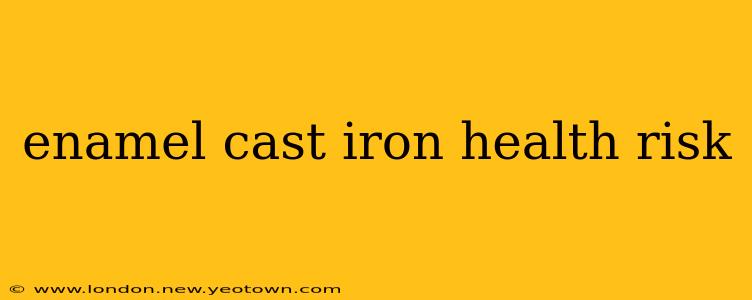Enamel Cast Iron: A Culinary Classic, But Are There Health Risks?
The comforting weight of a Le Creuset Dutch oven, the vibrant gleam of a vintage enamel cast iron skillet – these iconic pieces bring a touch of rustic charm to countless kitchens. But amidst the culinary nostalgia, a question lingers: are there hidden health risks associated with enamel cast iron cookware? Let's delve into this topic, exploring the benefits, potential concerns, and how to safely enjoy the magic of enamel cast iron.
My journey into the world of enamel cast iron began with my grandmother's treasured Dutch oven. Its chipped enamel told a story of decades of hearty stews and comforting bread baking. It was a cherished heirloom, and I wanted to understand its history and its potential impact on our health. What I discovered was fascinating, and, hopefully, this will answer your questions as well.
Is Enamel Cast Iron Safe to Use?
The short answer is largely yes, enamel cast iron is generally considered safe for cooking. The enamel coating protects the food from direct contact with the iron, eliminating the risk of iron leaching into your food in significant amounts. This is a key difference between enamel cast iron and uncoated cast iron, which can leach iron, though usually in amounts considered beneficial for many.
However, the "generally" is crucial. The safety of enamel cast iron cookware hinges largely on the integrity of its enamel coating.
What Happens if the Enamel Chips?
This is where the potential health concerns arise. If the enamel coating chips or cracks, the underlying cast iron is exposed. While occasional exposure to small amounts of iron isn't typically harmful to most adults, prolonged or significant exposure from a chipped enamel surface might be a concern for some individuals, particularly those with hemochromatosis (a condition where the body absorbs too much iron). Furthermore, chipped enamel can create rough surfaces that are more difficult to clean thoroughly, potentially leading to bacterial growth.
Can Enamel Cast Iron Leach Chemicals into Food?
This is a question that frequently pops up. The enamel itself is generally inert and doesn't leach harmful chemicals under normal cooking temperatures. However, the manufacturing process can sometimes involve the use of heavy metals, though regulations aim to minimize this. Always opt for reputable brands known for their quality control and commitment to safety.
Is Enamel Cast Iron Dishwasher Safe?
While many manufacturers claim their enamel cast iron is dishwasher safe, it's generally recommended to wash it by hand. The harsh detergents and high temperatures of a dishwasher can potentially damage the enamel coating over time, increasing the risk of chipping and exposing the iron beneath. Gentle hand washing with warm soapy water is the best approach to prolong the life and safety of your enamel cast iron cookware.
What are the Benefits of Using Enamel Cast Iron?
Despite the potential concerns, the benefits of enamel cast iron are numerous:
- Even Heat Distribution: Its excellent heat retention and distribution contribute to consistent cooking and delicious results.
- Durability: With proper care, enamel cast iron cookware can last for generations, becoming a cherished heirloom in your family.
- Versatility: It can be used on various cooktops, including induction, and is oven-safe.
- Aesthetic Appeal: Its timeless beauty elevates any kitchen.
Conclusion:
Enamel cast iron cookware offers a wonderful blend of functionality, durability, and aesthetic appeal. However, maintaining the integrity of its enamel coating is key to ensuring its safe use. Regular inspection for chips and cracks, hand washing, and purchasing from reputable brands are all essential steps to maximizing the benefits and minimizing any potential risks. Enjoy the culinary journey, but remember to handle your enamel cast iron with care!

